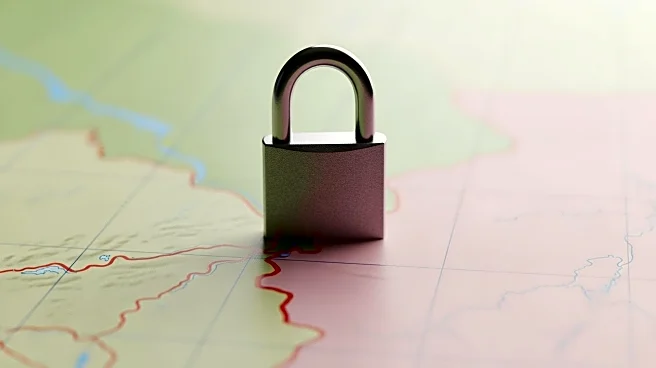What's Happening?
Lithuania has announced plans to indefinitely close its border crossings with Belarus following repeated disruptions caused by balloons suspected of smuggling cigarettes. The Lithuanian National Security Commission met after balloon sightings led to the
suspension of air traffic at Vilnius Airport on multiple occasions. The border crossings at Medininkai and Šalčininkai were closed temporarily, and the government is considering extending the closure indefinitely. Belarusian Foreign Minister Maxim Ryzhenkov criticized the move, calling it a provocation and suggesting that Lithuanian authorities should focus on local smuggling gangs.
Why It's Important?
The closure of the border with Belarus is significant as it highlights the ongoing tensions between Lithuania and Belarus, exacerbated by the suspected use of balloons for smuggling. This move could impact diplomatic relations and trade between the two countries. Lithuania's decision to close the border indefinitely signals a strong stance against what it perceives as hybrid aggression, potentially leading to increased sanctions and diplomatic actions within the EU. The situation also underscores the challenges faced by European countries in securing their airspace against unconventional threats.
What's Next?
Lithuania's Cabinet is expected to decide on the indefinite closure of the border, with exemptions for diplomats and EU citizens. The government may also push for additional sanctions against Belarus at the EU level. The situation could lead to further diplomatic tensions, with Belarus likely to respond to Lithuania's actions. The potential invocation of NATO's Article 4 for consultations could bring the issue to the attention of the alliance, although Lithuania's ambassador to NATO has suggested treating it as an internal problem.
Beyond the Headlines
The use of balloons for smuggling highlights the evolving nature of cross-border criminal activities and the challenges in addressing them. The incidents may prompt discussions on enhancing airspace security and cooperation among European nations. The situation also raises questions about the effectiveness of current border security measures and the need for technological advancements to detect and intercept unconventional threats.
















